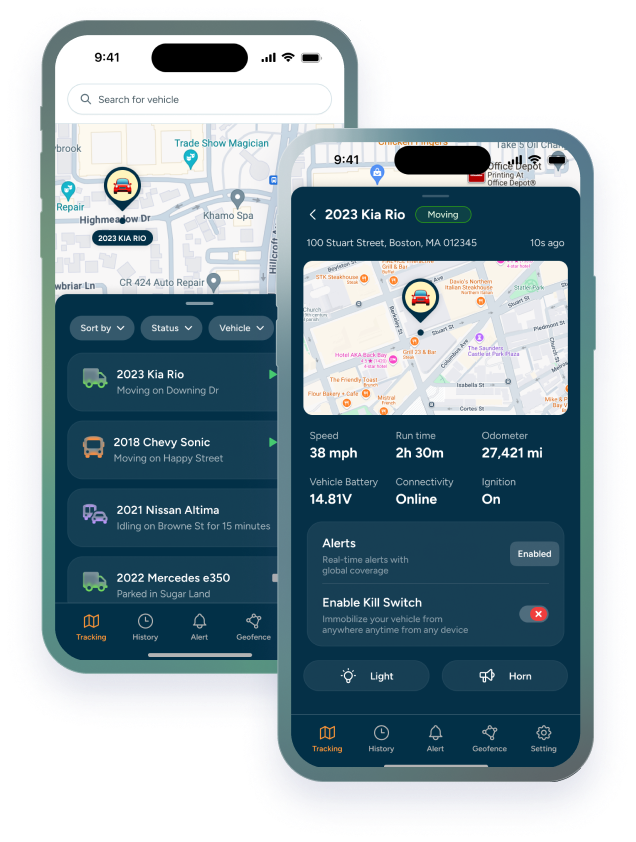Running a fleet is like managing a moving puzzle, with pieces spread across miles of road and countless destinations. For fleet managers and business owners, efficiency is not just a goal; it’s a necessity. One way to achieve this is by leveraging a fleet GPS tracking system. This technology works as a set of eyes on the road, keeping you connected to your vehicles in real time. From reducing fuel expenses to improving communication, a GPS tracking system can make an enormous difference in your daily operations.
Let’s take a closer look at how it enhances efficiency and helps fleets perform at their best.
Real-Time Tracking for Instant Insights
One of the most obvious benefits of a GPS tracking system is real-time tracking. With this feature, you always know where your vehicles are, whether they’re on the road, at a job site, or stopped for an unscheduled break.
Imagine this scenario: a delivery vehicle gets stuck in unexpected traffic. Without GPS tracking, drivers might have to wait it out while frustrated customers call to ask about delays. With GPS tracking, however, you can instantly identify the issue and reroute the vehicle, ensuring the delivery still gets made on time. This reduces downtime and enhances customer satisfaction, all while keeping operations running smoothly.
Route Optimization that Saves Time and Resources
Fuel prices can eat into a fleet’s bottom line, but smart route planning significantly cuts down unnecessary costs. GPS tracking systems often come with route optimization features that take into account current traffic patterns, road closures, and more to chart out the fastest and most efficient paths.
For example, if you manage a fleet of service technicians, sending them to multiple appointments in a day, an optimized route can reduce their total driving time. Less driving means fewer fuel stops, less wear and tear on vehicles, and quicker service for customers. The result? A leaner operation that saves both time and money.
Dramatic Fuel Savings
Fuel costs are one of the biggest operating expenses for fleets, but a GPS system helps keep these costs in check. Beyond route optimization, GPS tracking helps ensure more fuel-efficient driving habits. Many modern systems monitor behaviors such as speeding, idling, or harsh braking, which tend to burn more fuel.
For instance, a fleet manager might notice a driver has a habit of idling excessively at job sites. Using insights from the GPS system, the manager could coach the driver on cutting down idle time, saving hundreds of dollars in fuel costs annually. Multiply that saving across an entire fleet, and the financial impact is substantial.
Strengthened Communication and Coordination
Effective communication is vital in fleet operations, whether you’re managing five vehicles or fifty. A GPS tracking system improves this by streamlining coordination between drivers and dispatchers.
Consider a towing company responding to urgent roadside assistance calls. Dispatchers can use GPS tracking software to pinpoint the nearest available driver and send them straight to the customer, saving time and avoiding any confusion. Drivers can also receive updates through the system, eliminating the need for distracting phone calls. This means fewer delays, more jobs completed per day, and happier customers.
Enhanced Predictive Maintenance
Downtime due to vehicle breakdowns can throw a wrench into even the best-planned schedules. GPS tracking systems often integrate with maintenance alerts based on mileage, hours driven, or engine performance. Staying ahead of necessary repairs ensures fewer unplanned breakdowns and keeps your fleet running more efficiently.
Real-World Results
Many businesses have already seen measurable improvements in efficiency after implementing GPS tracking systems. A landscaping company, for instance, managed to reduce its average fuel usage by 15% simply by optimizing routes and curbing excessive idling. A delivery-service provider increased its daily job output by 20% by using real-time tracking to reroute drivers and avoid traffic delays.
Closing Remarks
A fleet GPS tracking system is more than just a tool; it’s an investment in operational excellence. By providing real-time tracking, intelligent routing, fuel savings, and better communication, it transforms fleet management from a guessing game into a data-driven process. For fleet managers or business owners wanting to maximize efficiency while cutting costs, GPS tracking systems are a game changer.
Are you ready to take control of your fleet’s potential? The road to greater efficiency starts here. Click here for a demo of our revolutionary platform.
